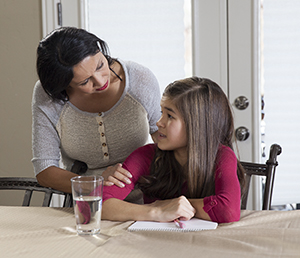It’s normal for children to have fears. They may be afraid of monsters, ghosts, or the dark. At times, they might be scared by a book or movie. In most cases, these fears fade over time. But children with anxiety disorders are often afraid. Or they may have fears that go away for a while but come back again and again. This may cause them great distress. It can prevent them from having a normal life. Children with anxiety disorders can have problems with sleep, appetite, and focusing. They can have problems with social situations and school.
What is an anxiety disorder?
An anxiety disorder causes children to be intensely fearful in situations that would not normally cause fear. They may be afraid of certain things, such as dogs or snakes. Or, they may fear a situation, such as being alone in the dark. Sometimes they may be too afraid to leave the house.
What is separation anxiety disorder?
Some children may have separation anxiety disorder. This means they dread being away from a parent or other loved one. They may worry that they’ll be harmed. They may worry that they'll never see their loved one again. In some cases, the child may refuse to go to school. They may have physical symptoms. These can include nausea or stomachaches.
Working on anxiety
Most children with anxiety can be helped with behavior therapy. This is done by a licensed healthcare provider trained to work with children. This may be any of the below:
-
Licensed clinical social worker (LCSW)
-
Clinical psychologist (PhD)
-
Advanced practice registered nurse (APRN) with a mental health specialty
-
Psychiatrist (MD)
The therapy is done in steps. When your child feels safe with 1 step, they can go on to the next. This helps your child slowly face and cope with their fears. For example, your child may be asked to just think about the feared object. They see that nothing bad happens as a result. The next step may be looking at a picture of the feared object. Later, they may face the feared object in person, with support and encouragement. Over time, your child will be less afraid. In some cases, certain prescribed medicines may help lessen a child’s anxiety.
Your role
Parents should talk to their child's healthcare provider first. They will need to rule out any physical problems that may cause the symptoms of anxiety. If anxiety is diagnosed, the healthcare provider can refer you to support for both your child and the family. They can help you learn ways to support your child’s mental health. Your love and support can help your child overcome their fears.
To learn more
Featured in


